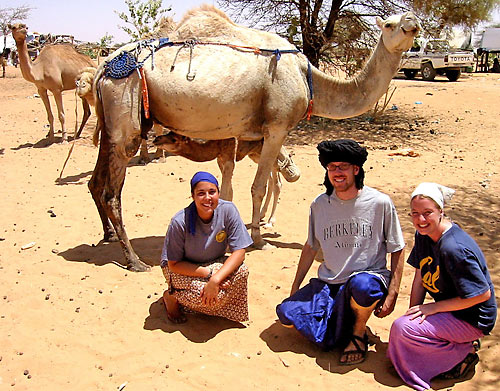A Hard Rain's A Gonna Fall
The rain came last week. And then something strange happened; it didn’t stop. Downpour downshifted into drizzle and settled in for two days. When it began I sat contentedly on the porch watching my foot-tall corn plants drink it in. At last, the rain!
But then came the leaks, one drip, then another, until all my buckets and bowls and pots and pans were catching water. Ploink, boip, cachink, ding…it sounded like an old west saloon shootout, bringing the smell of wet dog instead of death.
On the second evening text messages started coming from my site mate Andrew.
“I don’t know how much longer my poor house is going to hold up!”
“I can see light coming in through the roof!”
“Mud is coming into the room. I think the roof is going to fall.”
By morning it was time for an evacuation. Peace Corps contacted Kiffa’s World Food Program office and arranged a car. At the time I was in our leaky office, breaking down the computer system, putting everything in plastic bags, and hiding it in the driest corner.
I hitched a ride to the WFP office, and, dripping wet, presented myself to the director. He snapped his fingers, and suddenly I was in a pick-up truck with driver Mohamadou So, speeding towards Sagatar. (Nothing like being white in Africa, I thought…) Through town, right at the big mosque, around the hospital, and then dropping into a gully. So downshifted, plunged into the floodwaters, and shot me sideways glance, smiling as though to say “you think this baby can’t make it through a little water?” Water was coming over the hood of the truck, but we made it across coming and going.
We reached Andrew’s house and found his host family huddled under their concrete hanger. “How’s it going with the rain?” I asked. “The rain is good!” they answered. Even when their houses are falling, Mauritanians praise God for the rain.
We loaded the truck with Andrew’s belongings – mattresses, metal trunks, bags and buckets – in less than ten minutes. The footprint of the average Peace Corps volunteer is about one shoe-size above a camping trip.
On the way to my house, So pointed to piles of mud and logs and shaking his head. “See there, that was a house yesterday.” I shook my head too. What can you say?
Everyone expects a few thundershowers during Mauritania’s brief rainy season. Rumbles and flashes on the horizon, the temperature drops, everything becomes calm, and then it’s upon you. Sheets of water fall from the sky, punctuated by thunder claps and explosions of light. An hour later, it’s over.
But when rain falls in excess Mauritania just isn’t prepared. Brick and mortar turns to sludge, inviting gravity to finish the job. And then a year or two down the road, the locusts come, as they did last year, devastating the food supply and further entrenching the life-support system of foreign assistance.
The topic of Kiffa’s English Club the week before the storm was Hurricane Katrina. We talked about the devastation, the government’s response, and tried to imagine a similar situation in Mauritania.
“All the people would die,” my friend Issa said gravely.
Days later, the destruction was right before our eyes. Family and friends spread the news from other cities, like the dykes breaking in M’bout and destroying 400 homes, and some children drowning in another town.
Of course, the storm was but a fraction of a percent of the strength and scope of Hurricane Katrina. But wading through muddy water, helping to evacuate a friend, seeing the remains of families’ homes, I felt a cold irony. Just days earlier I was thinking about how hard it was, living in this desert, to relate to the biggest natural disaster in the history of my native country.
The recent rains were in many ways a catastrophe. But what falls quickly in Mauritania is rebuilt quickly too. There’s no insurance, but there’s little to insure. People will patch up their homes or build new ones without many complaints.
And the trickling sound of water filling the well next to my house reminds me that this inundation will mean more water for people, animals, and gardens over the next year. And, gulp, for the next plague of locusts.


<< Home